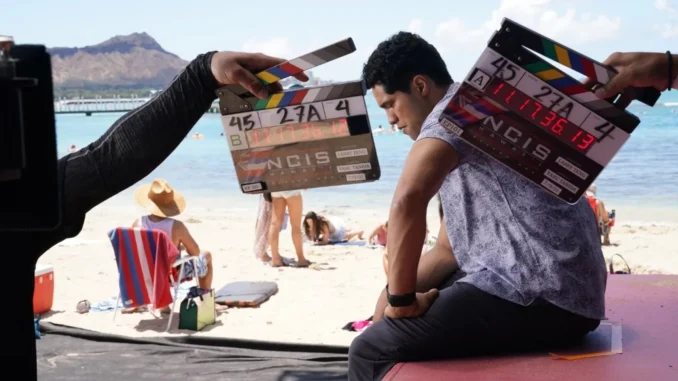
Hawaiʻi issued an estimated $24.5 million in film tax credits in 2024, according to a report to the state Legislature that looked at figures from last year. The money will go to 28 productions that were filmed in Hawaiʻi last year, including, but not limited to, the live-action “Lilo & Stitch,” “Temptation Island,” “The Bachelorette,” “Chief of War,” and “The White Lotus.”
However, those productions only generated about $20 million in tax revenue. The report comes as film productions have decreased across the U.S. in the last two years due to screenwriter strikes and the rise of streaming services. Film experts say the film and television industry can help boost local economies. States are also competing with each other, and other countries, to attract more film productions. The state’s film tax credit program is designed to draw motion picture productions to Hawaiʻi by offering a tax refund of 22% on Oʻahu and 27% on neighboring islands for productions to make television programs, movies and commercials.
But it’s not as competitive as other states that have tax credits of 30% or more, according to Georja Skinner, chief officer of the state Department of Business, Economic Development and Tourism’s Creative Industries Division. “It is important to remain competitive because it is a bottom line game for studios and productions who are seeking to come here, whether independent or major,” she said.
A push for higher tax incentives
In 1997, Hawaiʻi was one of the first states to create a film credit program. It started with a 4% income tax credit and a 6% transient accommodations credit. State lawmakers have raised the cap from then on, furthering adjustments to attract larger film productions. The program has been praised by supporters for bringing film productions to the state and criticized by local economists for costing taxpayers money.
Last year, “NCIS Hawaiʻi” spent more than $51 million filming Season 3 before CBS canceled the show in May 2024. The production will claim a $11.2 million refund. The dating show “Temptation Island” Season 6 spent more than $10 million and will claim a $2.7 million refund. “Lilo & Stitch” spent more than $15 million and will claim a $3.3 million refund. Skinner said the productions may receive their tax credits by July, but added there have been backlogs in previous years. “The state (tax office) is having its own challenges with hiring and we are glad to see that our tax office is fully staffed in their audit division now, and we anticipate that the process is going to be a little faster than it has been.”
Entertainment industry professionals are supporting legislative measures to create a film authority and to raise the film tax incentives cap, which is currently $50 million for all productions seeking to film in Hawaiʻi. It’s capped at $17 million per project. The measure doesn’t have a set cap increase, but Skinner advocates for a $10 million increase from the current $50 million cap. Sen. Lynn DeCoite, who authored Senate Bill 732, said the film industry is struggling and “it’s truly disappointing to see that few films are being made here.”
“The industry also does marketing and branding through tourism but also creates job opportunities that offer more than just a livable wage for local residents,” she said in a written statement. “Many businesses and occupations are directly linked to film producing, and supporting them would benefit the industry.” Last week, hundreds of film professionals rallied at the state Capitol to support raising the tax cap. Some held signs that read “Save the film industry.”

Tuiaʻana Scanlan, president of the International Alliance of Theatrical Stage Employees Local 665, said the film industry supports thousands of local families. “Thousands of local families get to prosper from it, along with the many local vendors that having local hires on the show will direct the purchases of that company towards local companies,” he said. “So the expansion of the investment money is significant. I think a lot of folks get caught up in the glitz and glam of the industry and not how the real world effects are on local hires and local vendors.” A state report showed a more than $324 million economic impact. Skinner said that’s due to a mix of productions applying for the film tax credit and those not applying.
“We have a lot of productions locally that do not participate in the tax credit program. Also, productions from offshore might be indie features or commercials or things of that nature,” Skinner said. “But that all counts because they’re all hiring people locally and getting film permits. The data itself comes from film permit logs from every county film office and our state film office.”